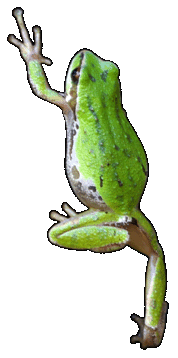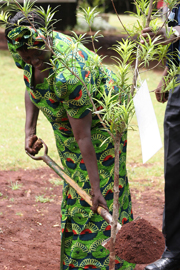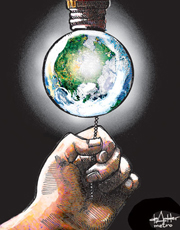 |
|
Go Greener! More Eco-Friendly
Ways To Enjoy Greener Living
Join the Green Revolution! Here are some additional ways you can make your household safer for the environment, reduce toxic waste and make your home and area environment a healthier place to live.
- Earth Easy: Sustainable Living – "Information, products and seasonal articles to help you lead a more sustainable life." Lots of useful household information for making greener choices about everything from natural pest control, water conservation and organic gardening to CFL & LED lighting and solar ovens.
(Website: eartheasy.com)
- David Suzuki's Nature Challenge – Green Living Made Easy! Offers loads of information on how to take care of the planet — at home, at work and in your community. Tips on reducing your carbon footprint, eating for a healthy planet and consumer guides for avoiding toxins…
(Website: davidsuzuki.org/NatureChallenge)
 Greener Cleaners
Greener Cleaners
- Natural Clean – Use cleaning products for your home and person that have no chlorine bleach, ammonia or formaldehyde and are made from naturally-derived ingredients. Their better for you, and for the environment. There are also many common and inexpensive natural cleaning alternatives.
- Baking Soda – Cleans, deodorizes, softens water, scours.
- Soap – Unscented soap in liquid form, flakes, powders or bars is biodegradable and will clean just about anything. Avoid using soaps that contain petroleum distillates.
- Lemons – One of the strongest food acids. Effective against most household bacteria.
- Borax (sodium borate) – Cleans, deodorizes, disinfects, softens water, cleans wallpaper, painted walls and floors.
- White Vinegar – Cuts grease, removes mildew, odours, some stains and wax build-up.
- Washing Soda (or SAL Soda) – Made of the mineral, sodium carbonate decahydrate. Cuts grease, removes stains, softens water, cleans wall, tiles, sinks and tubs. Handle with care, as washing soda can irritate mucous membranes. Do not use on aluminum.
- Isopropyl Alcohol – An excellent disinfectant. (Ethanol or 100 proof alcohol in solution with water can also be used.)
- Cornstarch – Can be used to clean windows, polish furniture, shampoo carpets and rugs.
- Citrus Solvent – Cleans paint brushes, oil and grease, some stains. (Citrus solvent may cause skin, lung or eye irritations.)
- Trisodium phosphate (TSP) – A mixture of soda ash and phosphoric acid, TSP is toxic if swallowed. It can be used for many jobs, such as cleaning drains or removing old paint, that would normally require much more caustic and poisonous chemicals, and has no fumes.
- All-Purpose Cleaner – In 1/2 gallon (2 litres) of water, mix up 1/2 cup vinegar and 1/4 cup baking soda (or 2 teaspoons borax). Store and keep. Use to remove water deposits and stains on shower stalls, chrome taps and fixtures, mirrors, windows etc.
- Don't Be a Drain – Why waste wash water? Divert dish and laundry water from the drain to use for watering flower gardens, shrubs and trees. Your plants will love it. Along with using environmentally-friendly cleaning products, this helps keep detergents out of sewers, septic fields and streams while conserving fresh water.

Greener Gardens
- Grow Natural – Avoid using pesticides, fertilizers and other non-organic gardening products and promote a diverse garden ecology that attracts insects such are earthworms, bees and ladybugs that actually benefit your garden, rather than harm it.
- Grow Natural – For more information about greener gardening check out City of Vancouver's Grow Natural program
(Website: grownatural.ca)
- Save Water – Don't waste it. Avoid over-watering which results in excess run-off. Stop leaks. Use hose washers and keep faucets and hoses repaired. Deliver water precisely, directly to the plants. Avoid spraying water continually through the air everywhere. Avoid watering during hot, sunny times of the day. Plant drought-resistant flowers and shrubs. Plant flowers tightly together. Dense gardens retain moisture. Use mulch to help retain moisture.
Greener Travels
- People Power – If you can, choose human power first. Walk, bike, scooter, skateboard — you choose. Not only will you help reduce greenhouse gas emissions, you'll get fit in the process.
- Try Transit – Find out if there's a municipal bus or commuter train you can take. Get familiar with transit routes that are convenient to your home, workplace and favourite entertainment destinations.
- Car Pool – Sharing rides is a good way to reduce traffic, save on gas and have more fun during regular commuting.
- Shop Local – Shop closer to home and support your friendly neighbourhood businesses. Know what you need? Place your order and get it delivered. On-line shopping and local delivery services often use less fuel to deliver more products to more customers in a given area.
Greener Planet

Wangari Maathai (2004 Nobel Peace Prize Laureate & Green Belt Movement founder) plants a tree outside the Outspan Hotel in Nyeri, Kenya to mark the launch of her autobiography, Unbowed.
Photo: Wanjira Mathai, Sept. 30, 2006 |
- Join the One Billion Trees Campaign – In November 2006, the United Nations Environment Program launched a global tree-planting initiative inspired by United Nations Messenger for Peace, Wangari Maathai, who founded the Green Belt Movement in Kenya in 1977. Communities, groups and individuals can go to the Billion Tree Campaign website to make a tree planting pledge, and to report back once the number of trees pledged have been planted. As of September 2009, a total of 7.4 billion trees had been pledged and planted as a result of this campaign. The goal to plant one billion trees annually has given public expression to the challenges of climate change and forest and eco-system degradation.
(Website: unep.org/billiontreecampaign)
- Celebrate! Earth Day Canada – In spring of 1970, public concern about the deterioration of Earth's environment sparked the proclamation and celebration of a new worldwide holiday — Earth Day! Over 20 million people marked the event with protests demanding measures to protect the environment. Today, a half billion people in 174 countries all over the world celebrate Earth Day to promote global environmental awareness and protect our planet's vital resources.
(Website: earthday.ca)

Earth Hour Cartoon, Metro News, March 27, 2009 |
- Earth Hour Canada – Since the event was conceived in 2007 by the World Wildlife Fund, hundreds of millions of people have turned their lights off for Earth Hour sending a powerful message about the need for global action on climate change. The annual event is held on the last Saturday in March, 8:30 - 9:30 p.m.
(Website: earthhour.org)
- World Wildlife Fund Canada (WWF-Canada): For a Living Planet – A member of the WWF Global Network, WWF-Canada was founded in 1967 by Senator Alan MacNaughton. With an active membership of over 150,000 Canadians, their mission is to stop the degradation of the planet's natural environment and to build a future in which humans live in harmony with nature.
(Websites: wwf.ca, wwf.org)
- Habitat Aquisition Trust
Established in 1996 by Victoria Natural History Society, the Trust can help register a conservation covenant (easement) on your land. This will protect it from future habitat degradation or loss.
(Website: www.hat.bc.ca)
- Ducks Unlimited Canada (DUC): Conserving Canada's Wetlands – (DUC) has been committed to wetland conservation for more than 70 years. Up to 70 per cent of Canada's wetlands have disappeared in settled areas of the country. Wetlands across Canada provide critical habitat for the life cycles of ducks, geese, swans and many other waterfowl species. But these wetland habitats also support approximately 600 species of wetlands plants, animals and insects…
(Website: ducks.ca)
|
 |






 Greener Cleaners
Greener Cleaners
